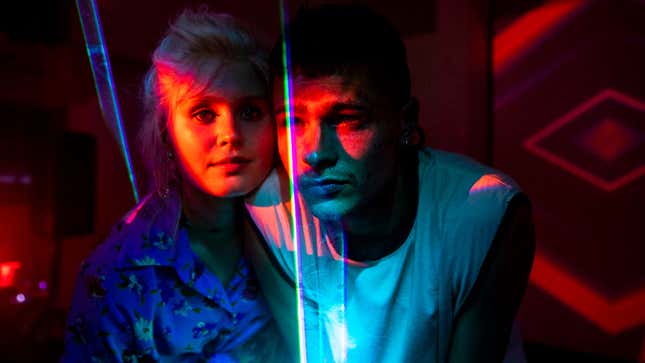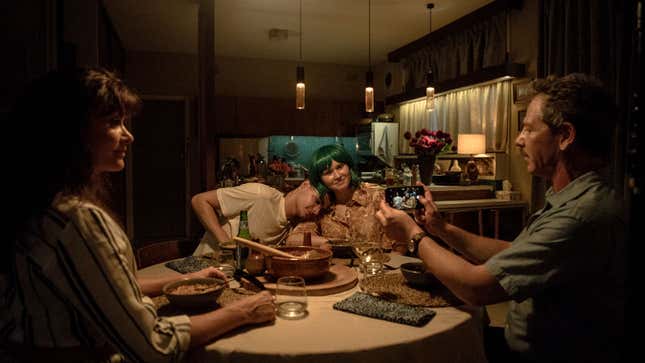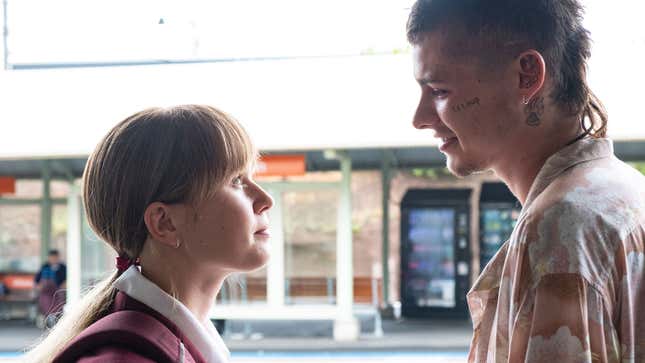Babyteeth Turns Tragedy Into Teenage Dream
Entertainment

A terminally ill teen gets to live out her days with the kind of guy few parents would approve of in any other scenario in Australian director Shannon Murphy’s debut feature Babyteeth, which is out Friday in theaters and on-demand. When the older Moses (Toby Wallace) literally runs into Milla (Eliza Scanlen) on a train platform, she falls hard. His motivation is harder to sniff out, but it’s at least possibly rooted in opportunism: She ponies up money immediately when he explains his dire financial situation and brings him home to meet her parents, Anna (Essie Davis of The Babadook) and Henry (Ben Mendelsohn). Moses’s drug habit and willingness to steal to support it is apparent virtually immediately; but instead of banishing him, Eliza’s psychiatrist father hatches a plan: He asks Moses to stay with the family in exchange for drugs that he can prescribe. He figures that his daughter, whose prognosis is not good, “should have the world at her feet right now.”
The moral shakiness of Henry’s plan provides the foundation of a movie full of uneasy observations and difficult truths. Anna’s and Henry’s relationship to drugs, all technically legal and thus of the socially acceptable variety, is presented more as a parallel than in contrast to that of Moses, a character that in less nuanced hands would be some unlikable hooligan. Wallace’s revelatory performance, via Murphy’s direction, strikes an incredible balance: You understand why Milla loves him and why her parents know it’s a bad idea for her to be with him, and yet allow it regardless. Based on the stage production of the same name, by Rita Kalnejais (who also wrote the movie’s screenplay), Babyteeth envisions a sort of temporary utopia wherein a teen girl gets to live the life she wants as it slips away.
Between Milla’s Day-Glo wigs and the mumbly approach to domestic drama, you might mistake Babyteeth as a quirk-fest upon viewing its trailer, but it’s actually much drier and less whimsical than that. “‘Quirky’ is my least favorite word on the planet these days,” Murphy told Jezebel earlier this month via phone from Australia. We discussed her allergy to over-explaining, her approach to portraying addiction, and why Milla was such a difficult character to cast. An edited and condensed transcription of our conversation is below.
JEZEBEL: What attracted you to Rita Kalnejais’s script?
SHANNON MURPHY: I was so distressed after reading it because I felt so upset that I was not going to have any more time with those characters. I thought, To pull this off is going to be really tricky, but that’s what drove me to make it. I thought this is going to be an incredible challenge to get this right. That drew me to it, as well as what it was saying, which was: Everyone is addicted to something. And yet, the story doesn’t judge these people for it. I was really into the idea of casting it in a way that you would fall in love with each character, irrespective of what drugs they were taking or how they might be behaving in this time of crisis.
I think the opioid epidemic has put things into perspective, but there has long seemed to be a divide in terms of social acceptability between using legal drugs and illegal ones, and I appreciated that this movie was more interested in blurring the lines than reaffirming that distinction.
I have a friend who works in rehabilitation for people who are struggling with addiction. I sent him the script and we met and talked about it. He just had this really beautiful, humanistic approach, going, “Take the drugs out of the conversation, and let’s talk about the behavior and what has led these people to this.” He would give me a lot of insightful potential backstories for the different characters. It was just connecting those dots beforehand and then working with the actors to share that.

You connected dots but you also erased some lines. Watching this movie, I felt that you must be allergic to over-explaining.
Completely. So often, when I watch TV or film, I go, “No one would ever say that line.” You can say it back out loud to yourself and go, “No, I’ve never heard anyone talk like that,” or, “Why would you say that in that moment?” I think for me, it’s about interrogating that. But you know, Rita is completely the same, so she had already done a lot of that. There were some things we took out in the edit, of course, but already on the page often, it was that way. Rita would cut things as we were rehearsing, and I think that’s the mark of a brilliant writer: Knowing how important what is not said is.
-

-

-

-

-

-

-

-

-

-

-

-

-

-

-

-

-

-

-

-

-

-

-

-

-

-

-

-

-

-

-

-

-

-

-

-

-

-

-

-










































